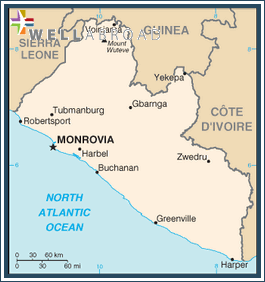|
MOST RECENT ALERTS
There's no recent alert.
|

|
|||||||||||||||
| COUNTRY OVERVIEW | ||||||||||||||||
|---|---|---|---|---|---|---|---|---|---|---|---|---|---|---|---|---|
|
| COUNTRY GENERAL INFORMATION | |||||||
|---|---|---|---|---|---|---|---|
| Language: |
English 20% (official), some 20 ethnic group languages, of which a few can be written and are used in correspondence |
||||||
| Currency: | Liberian Dollar (LRD) | ||||||
| Predominant Religions: |
Christian 40%, Muslim 20%, indigenous beliefs 40% |
||||||
| National Holidays: | Independence Day, 26 July (1847) | ||||||
| Economic Status: |
Despite nearly four years of peace and a renewal of economic growth, Liberia is still one of the poorest countries in the world and many basic services (public power, water and sewage, land line phones) are either limited or unavailable. |
||||||
| Security: |
Armed Forces of Liberia (AFL): Army, Navy, Air Force |
||||||
| US Presence: | |||||||
| Document Requirements: |
A passport and a visa are required for entry, as is evidence of yellow fever vaccination. Immigration officials do not issue visas at the airport. Persons arriving without a visa may be deported immediately, without leaving the airport. Persons arriving from the United States must obtain a Liberian visa before traveling. There is a U.S. $30 airport tax on departing passengers, although it is sometimes collected as part of the ticket price. For the latest information on entry requirements, visa fees and the airport tax for Liberia, contact the Embassy of the Republic of Liberia at 5201 16th Street NW, Washington, DC 20011, tel. (202) 723-0437, or visit the Embassy of Liberia website. Overseas, inquiries should be made at the nearest Liberian embassy or consulate. The U.S. Department of State is unaware of any HIV/AIDS entry restrictions for visitors to or foreign residents of Liberia. Information about dual nationality or the prevention of international child abduction can be found on our website. For further information about customs regulations, please read our Customs Information page. |
||||||
| Major Airports: |
Airports: 53 |
||||||
| Servicing Airlines: |
|
||||||
| Risks and Precautions: |
The Department of State urges U.S. citizens to plan proposed travel to Liberia carefully and to exercise caution when traveling in Liberia. Neither public transport nor taxis are available at the international airport, which is located 40 miles outside of Monrovia. Americans who travel to or reside in Liberia should realize that Liberia's police force is in the process of being rebuilt. There is a UN Mission in Liberia (UNMIL), but its mandate is to ensure political stability in Liberia. U.S. citizens in Liberia should be aware of their surroundings at all times and use caution when moving around, especially at night. U.S. citizens should avoid crowds, political rallies, and street demonstrations and maintain security awareness at all times.Crime in Liberia is rated high and is exacerbated by the high rate of unemployment. Theft, assault, sexual crimes, and murder are problems, and they occur more frequently after dark. Foreigners, including U.S. citizens, have been targets of street crime, robbery, and sexual assault. Women have been attacked on deserted beaches. Residential armed break-ins occur. The police are ill equipped and largely incapable of providing effective protection or investigation. Criminal activity is reported in both urban and rural areas. |
||||||
| Mortality Statistics: |
Infant MR total: 149.73/1,000 live births Life expectancy at birth: TOTAL 40.93 years (male 38.93/female 41.89) |
||||||
| Immunization Indicators: |
Required: Yellow Fever |
||||||
| Infectious Disease Concerns: |
Dengue, Leishmaniasis and Onchocerciasis (river blindness) are other diseases carried by insects that also occur in West Africa. African trypanosomiasis (African sleeping sickness) has increased in Africa (low levels are found in Liberia), and an increase in travelers has been noted since 2000. Schistosomiasis can be contracted in fresh water in this region. Polio outbreaks were reported in several previously polio-free countries in Central, Eastern, and Western Africa beginning in 2003. |
||||||
| Overall Quality of Medical Services: |
Hospitals and medical facilities in Liberia are very poorly equipped and are incapable of providing many services. Emergency services comparable to those in the U.S. or Europe are non-existant, and the blood supply is unreliable and unsafe for transfusion. Medicines are scarce, often beyond expiration dates, and generally unavailable in most areas. |
||||||
| Providers in Network: |
|
||||||
| Recent Medical Threats/ Concerns/Warnings: |
Highly pathogenic avian influenza (H5N1) has been found in poultry populations in several countries in Africa. Avoid all direct contact with birds, including domestic poultry (such as chickens and ducks) and wild birds, and avoid places such as poultry farms and bird markets where live birds are raised or kept. |
||||||
| Communications Info: |
Country Calling Code: +231 Internet Country Code: .lr |
||||||






